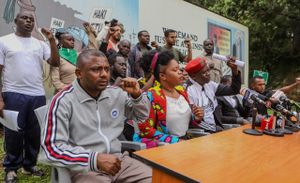Keith Siegel, a 65-year-old Chapel Hill native and dual US-Israeli citizen, has been released from Hamas captivity after 484 days, marking his return home on February 1, 2025. Siegel was freed as part of the fourth wave of releases governed by the current ceasefire agreement between Israel and Hamas.
Reports indicate Siegel was handed over to the Red Cross within Gaza City, alongside two other hostages, Ofer Calderon and Yarden Bibas. This exchange was greeted by cheers from the gathered crowds, albeit at a distance, as masked Hamas officials oversaw the release.
Siegel's return to freedom has been met with widespread relief and celebrations across the United States. White House Press Secretary Karoline Leavitt noted, "Today, Americans celebrate the return of American-Israeli citizen Keith Siegel and two Israelis who were held captive by Hamas terrorists since October 7, 2023." The statement emphasized the government's commitment to securing the release of all remaining hostages.
Notably, Keith's wife, Aviva Siegel, campaigned for more than their own release, tirelessly working toward the freedom of all hostages during his extended captivity. Aviva was also kidnapped during the October 7 attack but was released after 51 days. Upon Keith's release, he was said to walk under his own power, displaying resilience as he was greeted back by family.
Governor Josh Stein of North Carolina expressed joy for Siegel's return, stating, "Anna and I are rejoicing... Let us celebrate for the families who are finally reunited and continue working toward the freeing of all American hostages and lasting peace for the region." His sentiment reflects the broader national relief felt from this significant development.
Senator Thom Tillis, who noted the fragility of the current ceasefire, said, "This is a moment of great relief and celebration, but we cannot forget about the remaining hostages." His remarks serve as a reminder of the continued efforts needed to bring other captives home.
Senator Ted Budd, who also praised the administration's role, stated, "We are overjoyed for Keith Siegel and his loved ones... Thank you to President Trump for delivering the decisive pressure." Budd underscored the emotional importance of Siegel's return, recognizing the prayers of countless families impacted by the hostage situation.
The release of these three hostages is part of broader negotiations involving Israel, Egypt, and Qatar, contributing to efforts to secure the freedom of other captives. While celebrating Siegel's release, many still focus on the plight of around six remaining American hostages believed to be held by Hamas, urging continued vigilance.
During his time with Hamas, Siegel endured conditions characterized by suffering and uncertainty. Upon release, reports indicated he appeared physically weakened, yet resilient, waving and smiling as he transitioned from Hamas control to the waiting arms of the Red Cross. Subsequently, he was airlifted to Sourasky Medical Center in Tel Aviv for medical assessments.
Additional hostages freed as part of the recent agreement were similarly turned over to international authorities and will also undergo medical evaluations. The process highlights the complexity of hostage negotiations amid the backdrop of continuing regional conflicts.
The Israel-Hamas war, which began with the tragic events of October 7, 2023, and resulted in thousands of casualties and numerous hostages, underlines the urgency of achieving lasting peace and security for those affected by the violence.
While the focus remains on celebrating the return of Keith Siegel, it is imperative to maintain pressure and accountability to secure the release of all hostages, underscoring the importance of international cooperation and engagement.
Indeed, as various political leaders and officials reaffirm their commitment, the hope for enduring peace resonates not just for families like the Siegels but for the entire community impacted by the ramifications of the conflict. Now, more than ever, is the time to continue advocating for those who remain captive and building pathways to healing for all involved.



